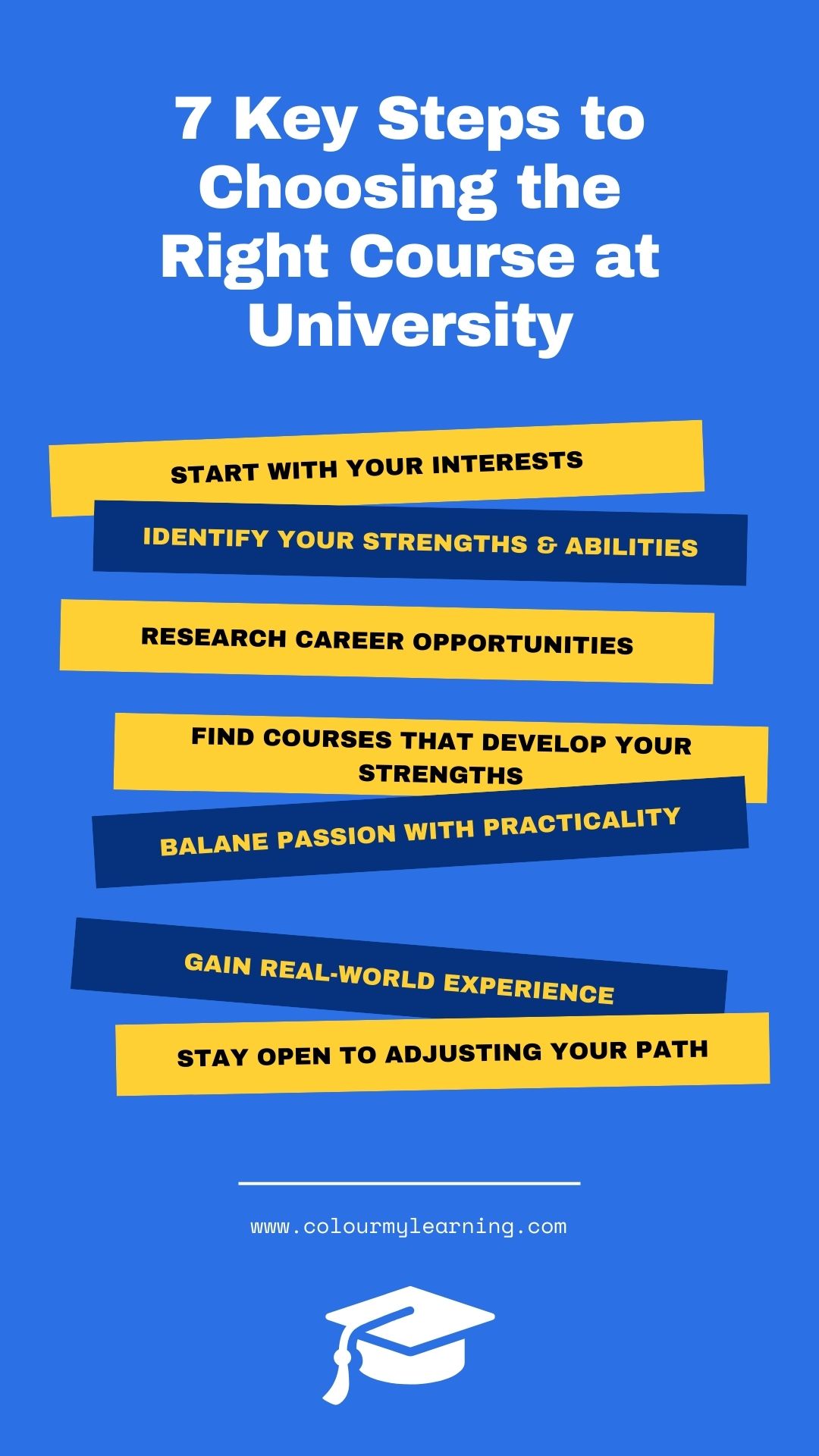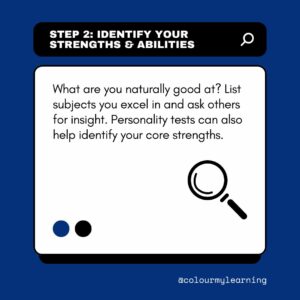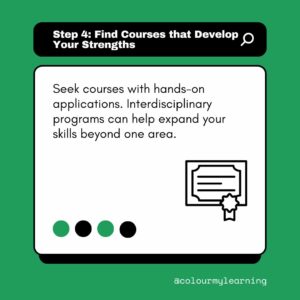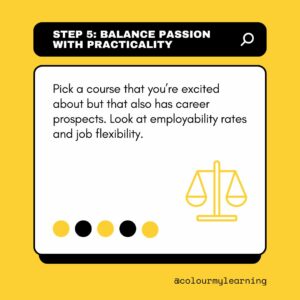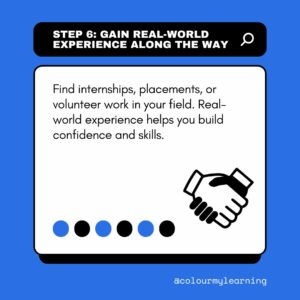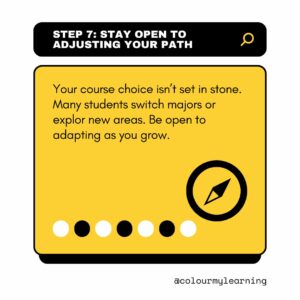7 Key Steps to Choosing the Right Course at University
Choosing the right course is one of the biggest decisions you’ll make in university. It’s about more than just following your interests—it’s about aligning your strengths, skills, and career goals with what you’ll study. You want to love what you learn, but focusing only on your passions may not always set you up for success. So how do you balance your interests with your natural abilities and career goals?
This guide will walk you through how to match your interests with your strengths and how to use that combination to choose a course that opens doors to rewarding career paths.
Step 1. Start with Your Interests—but Don’t Stop There
Let’s begin with your interests. We all gravitate toward certain topics or activities, whether it’s arts, science, technology, or helping others. While it may be tempting to choose a course based solely on your interests, that is just one piece of the puzzle. Interests can shift over time, so it’s important to choose a course that also leverages your strengths and abilities.
Take a moment to think about:
- What subjects or topics naturally excite you?
- What activities do you enjoy in your free time?
List Your Passions
Start by listing the subjects, topics, and activities that naturally excite you. Do you love solving problems, creating things, or helping others?
Think Beyond Interests
Remember, interests alone aren’t enough. Choose a course that also uses your strengths to build lasting skills. For example, if you love writing and are outgoing, you might thrive in journalism or media studies rather than in purely creative writing.
Try This
Write down your top 3 interests and list related fields or courses. Reflect on how your strengths align with each option.
Step 2. Identify Your Strengths and Abilities
After thinking about your interests, it is important to consider your strengths. Your strengths are the skills and abilities that come naturally to you, the things you excel at with minimal effort. These strengths could be academic (like problem-solving or critical thinking) or practical (like communication, creativity, or teamwork).
How do you identify your strengths?
List subjects you excel in
Think about the subjects you’ve consistently performed well in. For example, if you’re strong in maths and logical reasoning, fields like engineering, economics, or computer science might be worth considering. Also you can ask others for insights. Friends, teachers, and family members often see strengths we overlook.
Consider a personality assessment.
Tools like CliftonStrengths (Gallup version $24.99 | High5 test FREE version) or Myers-Briggs personality test can offer insights. But remember, these are just guides—ultimately, you know yourself best.
Optimise strengths and interests together
Once you have a list of strengths, ask yourself how these strengths can complement your interests. For example:
- If you love writing and have a knack for clear communication, journalism, media, or PR could be a great match.
- If you enjoy technology and are good at logical thinking, courses in computer science, data analysis, or software development could suit you.
In optimising your strengths alongside your interests, you can choose a course that will feel natural to you that will give you a greater chance of success.
Step 3. Research Career Opportunities that Match Your Skills and Interests
Now that you have considered both your interests and strengths, it’s time to research careers that align with those. Ideally, you want a course that will align with what you’re good at and lead to career opportunities that excite you.
How to Research Careers
Explore careers that blend your strengths and passions.
If you enjoy problem-solving and creativity, fields like architecture or UX design may be great options. If you’re drawn to helping others and excel in the sciences, you might explore nursing or healthcare.
Check job boards
Often there is a whole world of careers and opportunities out there that many of us are unaware of. A great way to find out about potential future careers is to scour online Job boards and websites. Sites LinkedIn, Glassdoor, Indeed may give you ideas for roles related to your strengths and interests. You can look up what the typical career paths for graduates of your potential courses are?.
Look at industry trends.
Are there emerging fields that combine your abilities with your passions? For example, fields like green technology, AI, or sustainability are booming and may align with both your talents and interests.
Where possible speak to your parents, their friends and your teachers and tutors as they may have friends in industries that you are interested in. Reach out and try to organise some work experience especially in fields that you think you are interested in. It is important to consider the real-world applications of your strengths and how they can evolve into fulfilling careers.
Step 4. Find Courses that Develop Your Strengths Further
Once you have a sense of your strengths, you can then focus on finding courses that will develop those skills further. Choosing a course that complements and enhances your existing abilities will help set you up for long-term success in your chosen career. Also read our post on How to choose the right University
How to focus on strengths when evaluating courses
Look for courses with practical applications.
For example, if your strength is teamwork or leadership, find courses with group projects, internships, or placements.
Choose courses that challenge you.
If you’re already good at something, don’t settle for a course that just skims the surface. Opt for a degree that will push your skills to the next level.
Consider interdisciplinary courses.
Some universities offer interdisciplinary programs that let you combine strengths from different areas. For example, a joint degree in Business and Technology can blend your communication skills with your analytical abilities.
Explore course details
You may not be privy to every detail of every course in the universities that you are considering, but most of them to provide details of their modules, assessment styles and often they provide names of lecturers/tutors who will be teaching. You can with a big of digging find out quite a lot about course details online.
Many universities also offer the option to ‘speak or chat online’ with someone who is currently on a course you might be interested in. Take advantage of that to find out more about what it’s like to study at that university and on that particular course.
Step 5. Balance Passion with Practicality
While it’s great to be able to choose a course that excites you, you also need to consider the practical side. Are there solid job prospects in the field? Does this course prepare you for a wide range of roles? Will it develop transferable skills that you can apply in multiple career paths?
To find the right balance
Research the employability rates
Look up employability rates for graduates of the courses you’re considering. Some degrees, like medicine, engineering, or computer science, have consistently high demand. Others may offer more niche opportunities, which can be rewarding but potentially more competitive.
Consider flexibility
Consider how flexible the degree is. Some degrees offer a broad skill set that can lead to various career paths, while others are more specialized. For instance, a course like Business Management may offer more flexibility than a highly specialized field like Marine Biology.
Make sure the course you choose does fulfil your passions and also set you up with options for your future.
What if I’m passionate about something with no prospects?
Sometimes it may seem impossible to figure out how to match what you like or love to do with a known career and it might be scary and worrying. But, the world is a fluid and ever-changing way and more and more people are following their passions and their dreams and making a worthy life out of every experience. If there does not yet seem to be an obvious career prospect, do not give up if you’re really, really passionate about something. Things do have a way of working themselves out.
Step 6. Gain Real-World Experience Along the Way
As you develop your strengths and grow your abilities and passions in a course, it is essential to also test those skills in the real world. Look for programs and opportunities that offer practical, hands-on experience to refine your abilities and prepare you for the working environment. Internships, placements, or industry projects even summer jobs or volunteering prospects are invaluable ways to build on what you’re good at and develop even more skills and knowledge.
Examples of practical experience
- Engineering students: Look for programs that offer industry placements with leading companies.
- Media and Communications students: Consider courses that include internships with media outlets, PR agencies, or marketing firms.
Practical hands-on experience helps you learn to translate your strengths into professional environments and often that gives you a head start on career opportunities and contacts after graduation.
Step 7. Stay Open to Adjusting Your Path
Remember, your first course choice doesn’t have to define your entire future. Many students switch courses after realizing their strengths align better with something different. Others discover new strengths along the way that open up new possibilities.
If you feel like your initial course choice is not challenging your abilities enough or isn’t aligned with your future goals, don’t be afraid to explore other options. Universities are often open to discussing how to make your program of learning more flexible to allow you to switch majors or add a minor, giving you room to adapt as you grow. While it may sometimes be a case of embedding core basic skills, sometimes you just know when a course is simply not the right fit. When that happens, reach out, speak to your parents, lecturers and personal tutors who will be able to help advise and help you navigate the path that lies ahead.
Conclusion
Choosing the right course is about more than just following your interests—it’s about finding where your strengths and abilities meet exciting career opportunities. By identifying your strengths, researching career prospects, and choosing a course that develops your talents, you can set yourself up for success in both your studies and your future career.
Remember your path is unique to you. Take your time, do your research, and don’t be afraid to balance passion with practicality. The right course for you is out there—it’s just a matter of matching what you love with what you’re great at.
Also read our guides
How to Choose the Right University: A Step-by-step Guide
Essential Questions to Ask at a University Open Day
University Rankings and Where to Find Them
